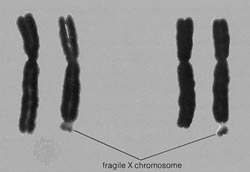Study population by X chromosome
The department of genetics at Leicester University is well known for its studies of human population using the Y chromosome, which includes the relationship between the male family and the Y chromosome as well as understanding Their knowledge of Viking settlements in northwestern England.
Now a new study uses the X chromosome (which has a copy of the male sex chromosome pair, but has two copies in women) that will be the first non-gender-specific evolutionary tool. aiming to provide a more balanced gender perspective on human population studies.
Although the Y chromosome has been shown to be a better evolutionary tool and is used a lot in evolutionary research. Although there are many benefits, it also has many limitations that prevent it from becoming the most evolutionary piece of DNA in the human genome.
The above problem is among the post-doctoral studies of Holly Leung. She is currently investigating the potential of the X chromosome as a gene segment containing many evolutionary information in our genome.

(Photo: www.britannica.com )
Holly said: 'This may be the real key to help us solve many mysteries that still entail the evolution of human population, such as the' beyond Africa 'theory or the expansion. expansion of the Neolithic period on European territory '.
'Y chromosome is the most popular evolutionary tool we use in population studies. But that does not mean it is the most evolutionary piece of information in the human genome. '
'There are a lot of limitations when using the Y chromosome to make it impossible for all evolutionary studies because it is just a male gene. It provides information about one gender. With a gender-specific marker gene, it has limited the diversity of information sources'.
'My research goal is to create and evaluate the usefulness of the evolutionary information that X chromosomes bring. It shares a number of features with the Y chromosome, but provides a broader perspective on human evolution because it has both male and female genomes and it contains many striking points. independent genetic markers'.
Holly Leung was only 24 years old, graduated from the University of Leicester School of Medicine and Pharmacy in 2006. The same year she continued her studies in Genetics with Genetic Research at the time she discovered her passion. for evolutionary genetics especially in the field of human population evolutionary history.
The study will be published to everyone at Leicester University on Thursday 26 June. The graduate research festival will introduce the public to the next generation of inventors, researchers and opportunities for graduate researchers to explain the practical meaning of studies with a large audience.
- The discovery denies the possibility of men going to be extinct
- Shocking detection of Y chromosome
- The Y chromosome is slowly degenerating
- Female is XX, male is XY, but why not have YY chromosome?
- Chromosome X story: The evolution of a sex chromosome
- The caveman virus can increase the birth rate of boys
- The Y chromosome helps detect nesting tools
- Why is male higher than female?
- Skinny or fat due to chromosome sequence 16 decided
- Why humans have the ability to orient?
- How does Vietnam go on the map of human genes?
- Looking back at the past, present and future world population
 Why do potatoes have eyes?
Why do potatoes have eyes? 'Tragedy' the world's largest carnivorous life: Death becomes ... public toilet
'Tragedy' the world's largest carnivorous life: Death becomes ... public toilet Tomatoes were once considered 'poisonous' for 200 years
Tomatoes were once considered 'poisonous' for 200 years Detecting microscopic parasites on human face
Detecting microscopic parasites on human face